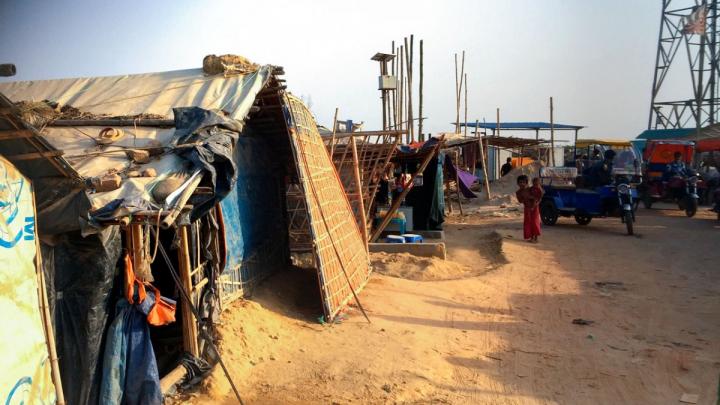
Credit: John Hoddinott, Cornell University
ITHACA, N.Y. – Electronic food vouchers provided young Rohingya children in Bangladeshi refugee camps with better health and nutrition than direct food assistance, according to new research led by Cornell University, in conjunction with the International Food Policy Research Institute.
The electronic vouchers are provided by United Nations’ World Food Programme to Rohingya families forcibly displaced into refugee camps. As of last summer, more than 911,000 Rohingya – a Muslim minority ethnic group of Mynamnar nationals who have faced decades of persecution – were living in Bangladesh, where they relied on international aid for food, shelter and medical care.
“We were trying to assess the impact of the nutritional status of children,” said lead author John Hoddinott, the H.E. Babcock Professor of Food and Nutrition Economics, who holds appointments in the Division of Nutritional Sciences, the Charles H. Dyson School of Applied Economics and Management, and the Department of Global Development.
“The refugees are hungry and food-insecure. Giving them food helps but results in a monotonous diet,” he said. “Often people have a better idea of what foods they need. If families are given an electronic voucher – much like the Supplemental Nutrition Assistance Program in the U.S. – families can buy a range of food products in the small markets in the camps.
“In our observations, we found that Myanmar’s refugee children were better off if their household received an electronic voucher,” he said.
Hoddinott and his colleagues report that electronic food vouchers allow families to buy a greater range of nutritionally diverse foods. Electronic food vouchers are more efficient than transporting food. The Rohingya get about $9 a month in their electronic food vouchers, which look like debit cards.
In the humanitarian refugee camps, the economists measured the heights and weights of 523 children, ages 6 months to 23 months. They found that receipt of the electronic voucher was associated with improved height.
“These children are at a point in their development where they grow rapidly,” Hoddinott said. “That kind of growth requires a variety of foods that are calorically and nutrient dense.”
There are circumstances where delivering food is a better option, but “when we want to make these monetary transfers for vulnerable populations, we want to be as efficient as possible,” he said. “The money we spend on program administration or transporting food from one continent to another costs money that can’t be used to help people directly.”
###
The research, “Food Transfers, Electronic Food Vouchers and Child Nutritional Status Among Rohingya Children Living in Bangladesh,” was published recently in the online journal PLOS ONE.
In addition to Hoddinott, the study’s co-authors are Paul Dorosh and Gracie Rosenbach, International Food Policy Research Institute; Mateusz Filipski, University of Georgia; and Ernesto Tiburcio, Tufts University.
Media Contact
Lindsey Hadlock
[email protected]
Original Source
https:/
Related Journal Article
http://dx.




